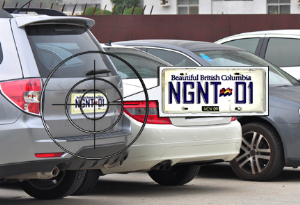
By John Chigos
I have usually found that attempting to engage the ACLU in anything like a reasonable debate is a fruitless endeavor, but considering a recent blog post on privacysos.org, an ACLU offshoot website run by Kade Crockford of the group?s Massachusetts branch, I felt I should speak up once again regarding some outrageous claims regarding LPR.
In the February 11th entry of ?sosadmin?s blog,? The author (who I assume is Mr. Crockford, although no explicit identification is given) makes a number of assertions about LPR and its use in counter-terrorism.
His remarks are a response to Chief Jeff Potts of the Bloomington, Minnesota, police department, who spoke to the state legislature in an effort to oppose a bill that would limit data retention periods for LPR.
An important part of Chief Potts? argument was that LPR is used to prevent and investigate terrorism.
In response, the author of the privacysos.org blog stated, ?no law enforcement agency in the country has made public any information that shows license plate readers have been useful in preventing one single terrorist attack?in the history of the world.?
Notice how carefully the author chooses his words here. He doesn?t say that LPR hasn?t been useful in preventing terrorism. He just says the police in this country haven?t publicized it.
Why does this surprise him? To suggest that the police should publish all of their counter-terrorism strategies is akin to saying President Obama should have let Bin Laden know when and where Seal Team Six was coming for him.
We may never be able to know exactly how the technology is used in defense of national security, because to reveal it is to take away our advantage over the enemy.
We do know some related facts, however.
First, we know that approximately 70% of all crime in this country ?which includes terrorism? is related to a motor vehicle.
That statistic comes to us from the International Association of Chiefs of Police, a source I trust even if the ACLU doesn?t.
We also know that license plate and/or vehicle information were instrumental in the investigations of both the 1993 World Trade Center bombing and the Oklahoma City bombing in 1995.
Finally, we know that in other countries, such as the UK, LPR is documented to have been used to great effect to thwart terrorist attacks.
The author?s position on this issue is disingenuous at best and reflects, I believe, a deep-seated distrust of anything law enforcement does.
But that isn?t even the most scurrilous claim the author makes.
Later in the piece, he writes, ?Instead of tracking ISIS as terrorists drive around Bloomington plotting mythical terrorist attacks, the police in Minnesota will use license plate readers to track ordinary people as they go about their lives, just as police nationwide use other surveillance technologies at their disposal.?
How, exactly, does he know this?
Does he really think that most police officers have nothing better to do with their time than sitting around monitoring the activities of random strangers?
Even if they did, does he think that the manpower exists to track everyone 24/7?
Just because a machine records a piece of data does not necessarily mean that it will be looked at or used in any way.
I hate to tell the author this, but his life isn?t as interesting as he may think it is.
The fact is that LPR has been around for decades and has a voluminous record of saving lives and fighting crime.
The evidence of the technology?s misuse, on the other hand, is effectively non-existent; if it weren?t, sosadmin would be trumpeting it from the mountaintops instead of making baseless accusations against the police.
Do we really want to handcuff all of our law enforcement and security personnel to the point that they can?t connect the dots in the event of a terrorist plot?
Do we want a free flow of narcotics traffickers across our borders and into our country; people who we know are willing to perpetrate heinous acts of violence to protect their business?
I don?t think I am being at all melodramatic in stating that if we do not use every piece of technology at our disposal to stop these criminals, we are opening ourselves up to another 9/11.
Are we prepared to make ourselves weaker and more defenseless in the name of a concept of privacy that doesn?t even exist in the Constitution?
Remember, LPR collects public information ?the kind of information the courts have already ruled does not carry an expectation of privacy.
Furthermore, this information is meaningless until it is checked against a secure database.
The worst part of all this, though, is that this is the same drumbeat the ACLU has been pounding since July 2013 when they released their report on LPR.
Personally, this is getting really boring, quite honestly. As I?ve said many times before and will say again, the technology genie is out of the bottle.
It?s not going back in.
So the non-stop hysterical ranting from so-called privacy advocates isn?t accomplishing anything except making them look hysterical.
State legislatures have taken up the question of how to properly regulate the use of LPR and will resolve it in time.
It?s time to let the police get back to doing what they do best, and to let them have the tools they need to do it.
About The Author: John Chigos is the Founder, Chairman & CEO at PlateSmart Technologies, Inc. http://www.platesmart.com/
SecurityHive: Opinions expressed by contributors and commentators do not necessarily reflect the views of SecurityHive.
Agree. Have a differing opinion? Leave your comments below.
Source: platesmart.com

